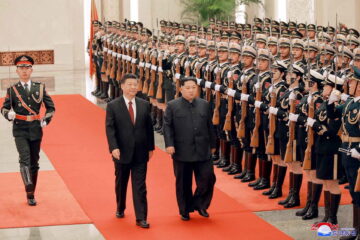How does RESEMBLING THE PEOPLE YOU REPRESENT lead to a better Defence of their Interests?
What you want to understand… 🤔
- What are passive and active representations?
- How does passive representation lead to active representation?
- How does it work in bureaucracies?
- Are quotas efficient in politics?
According to Pitkin and Mosher, passive (descriptive) representation means that a person resembles the people he represents e.g. a black person representing a black community. As for active (substantive) representation, it is a situation in which a person acts first of all in the interests of those that he represents, regardless of whether he resembles them or not. In this essay, we will address the question of representation in bureaucracy as well as in politics.
We will analyse the ways in which having someone who resembles the people he represents leads to a better representation of their interests.
We will first study the ways in which bureaucrats who resemble those they serve can better defend the latter’s interests. Then, we will see how descriptive representation of minority groups and women in politics paves the way for a substantive representation of their interests. Eventually, we will understand that how passive representation leads to substantive representation is a challenging and lengthy process.
I. Bureaucrats’ deeds favour citizens who share the same social origins and values
According to the Theory of Representative Bureaucracy, Meier and Nigro argue that passive representation leads to active representation because bureaucrats have the same social origins as those they serve. Their socialisation experiences being more or less similar, they will adopt political attitude that are specific to their community. These attitudes then translate into behaviours that favour the interests of their community. For example, a better representation of minorities in high ranks of the police can bring about changes in the relations between police officers and citizens from these minority groups. Indeed, minority members among police ranks would have shared their experience and fostered an adaptation of practices to better serve the interests of their group.
Riccucci and Van Ryzin add that sharing social origins entails sharing similar values. Assuming that bureaucrats act according to their values, their deeds will benefit those who also share these values. The authors provide evidence for that, stating that female bureaucrats are more likely to promote programs that benefit women.
Passive representation can lead to active representation according to the Theory of Representative Bureaucracy insofar as bureaucrats have discretion to act on their own values and authority over policies that are relevant to their fellow community members.
II. Quotas in politics lead to greater importance given to issues concerning minorities and women
In politics, quotas can take the form of reserved seats, party quotas or legislated candidate quotas for example.
Paxton et al have shown that descriptive representation can lead to more substantial representation. Indeed representatives may prioritise certain issues that directly concern who they are and who they represent. Therefore, they may introduce and vote for legislation that is aligned with the interests of those who they represent.
Furthermore, evidence shows that when a representative resembles those he represents, he is more responsive to their requests. For instance, in the UK Parliament, there is a gender bias on the prioritisation of some issues. Women tend to focus more on topics like child poverty and welfare reforms whereas men seem more interested in defence matters for example. Likewise, according to Clayton and Zetterberg, women quota shocks are associated with a redirection of funds from areas more prioritised by men (e.g. military spending) to some more prioritised by women (e.g. public health). Moreover, these funds for the health sector target areas where women are the most affected like maternal and reproductive health.
Clayton and Zetterberg also highlight three ways in which a better descriptive representation of women in Parliament through quotas leads to a better substantive representation of their interests. An immediate effect of quotas would be to scare an all-man Parliament that would start changing its practices and take actions in favour of women. Male representatives can also enter alliances with newly elected female representative and work together on policies that would take into account women’s concerns. And, as we have already discussed, newly elected women can directly impact political output on their own.
III. The path from passive to active representation is not straightforward
Authors like Childs and Krook have identified a “critical mass” i.e. a threshold from which passive representation starts producing substantive impacts on policies. To reach this “critical mass”, quotas and time are necessary to create hope and inspiration among minorities and women. As a result, they would reach the same level of knowledge and skills as people in the majority group and then access positions of power, eventually rendering quotas useless.
This process risks being even longer since some bureaucrats and politicians may suffer from the impostor syndrome because they feel like that they hold positions of authority only thanks to their identity and not their competences. Since they doubt their abilities and their legitimacy to act, they may refrain from doing as much as needed to defend the interests of those they represent, thus delaying the transition from passive to active representation. Likewise, sometimes in order to fit in and not fall into stereotypes, representatives may take the opposing view of what was expected from them.
Sometimes minority members and women end up in low position in the hierarchy and receive orders from people who belong to the majority group. Hence, their ability to bring about changes that would benefit their own group is undermined.
Conclusion
In conclusion, we can say that passive representation in bureaucracy leads to active representation because bureaucrats act according to values that are shared with people from the same community. It results in bureaucratic practices that are aligned with their community’s preferences and interests. In politics, quotas help minorities and women get into positions of power where, sometimes with the help of members of the majority, they support policies that directly affect the people they represent. However, the process that leads to active representation is lengthy and not without difficulties since bureaucrats and politicians may refuse or be unable to take substantive steps in favour of the interests of those they represent and resemble.



5 Comments
Dutch News Today · 9 May 2023 at 3:48 am
Just desire to say your article is as amazing. The clearness for your post is
simply excellent and i could assume you’re an expert on this subject.
Well together with your permission allow me to snatch
your RSS feed to keep up to date with forthcoming post.
Thanks a million and please keep up the enjoyable work.
fafaslot · 23 March 2023 at 10:39 pm
Its such as you read my thoughts! You seem to grasp a lot approximately this, like you wrote the book in it
or something. I think that you can do with some p.c.
to pressure the message home a little bit, but other than that, this
is wonderful blog. A great read. I’ll certainly be back.
Project sneakerhead · 22 March 2023 at 6:03 am
I am extremely impressed with your writing skills as well as with the
layout on your weblog. Is this a paid theme or did you modify it yourself?
Anyway keep up the nice quality writing, it’s rare to see a great blog like this one
these days.
sumvip · 15 March 2023 at 12:15 pm
Keep this going please, great job!
UGANDA: the “Pearl of Africa” - geopol-trotters · 31 March 2023 at 7:35 am
[…] Quotas have been implemented so as to reserve seats for women, union representatives, representatives of the youth, representatives of the elderly, representatives of people with disabilities and representatives from the army. […]